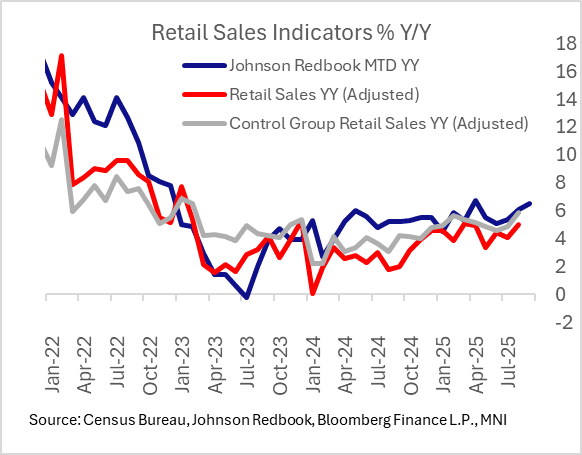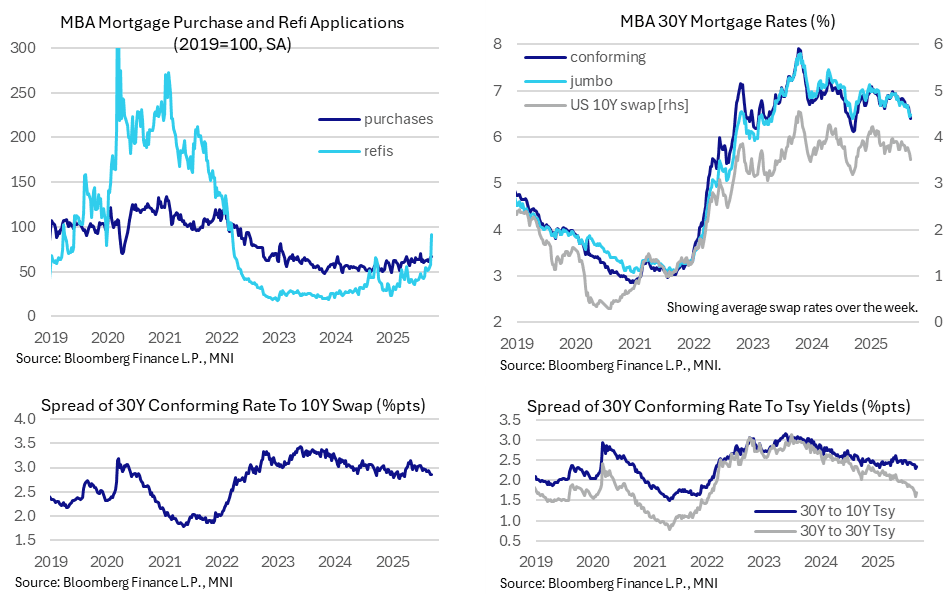US-CHINA: Hassett-US Not In Trade War w/China
(MNI) London - Speaking to Fox Business, Director of the National Economic Council Kevin Hassett talks on several topics, including relations with China. Hassett says that "We're not in a trade war with China", and that he is "Confident we can get back to a place that is good for both countries." Hassett adds the White House "have been disappointed in some of China's actions", likely referring to the Chinese gov'ts "announcement No. 62 of 2025" that imposed controls on rare earth exports. Hassett says that China "has a little bit of leverage right now", but claims the measures would hurt China more than the US. Says that he does not believe China will impose the measures.
- As noted a short time ago (see 'US-CHINA: Trump Comments in Full:', 12:23BST), President Donald Trump confirmed his intention to meet with Chinese President Xi Jinping at the Asia-Pacific Economic Cooperation (APEC) summit in South Korea at the end of the month. He also indicated that the 100% tariff to be imposed on China from November is "not sustainable".
Want to read more?
Find more articles and bullets on these widgets:
Historical bullets
EU: Council Agrees To Open Talks w/UK & Canada On SAFE Defence Instrument
The Danish Presidency of the Council of the European Union posts on X: "Coreper unanimously agrees on mandate to Commission to open negotiations with the UK and Canada on their participation in the SAFE-instrument." The Security Action for Europe (SAFE) instrument is an EUR150bln loan instrument indended to boost defence production across the Union. Initially, in order to gain approval for EU funding, at least 65% of the value of the weapon system being acquired has to be made in an EU member state, Ukraine, or in a EEA/EFTA country (Norway, Iceland, Liechtenstein, Switzerland), leaving a limit of 35% of components from other nations.
- Following the signing of the EU-UK security and defence partnership in May, the 35% limit for the UK was removed. The Guardian reported earlier that France is pushing for a ceiling to be imposed at 50% British components in any SAFE-financed project.
- The French demands risk intra-EU friction. Paris has long favoured EU 'strategic autonomy' in issues such as defence procuruement, primarily targeted at reducing reliance on US material. Since Brexit, this drive has also been focused at the UK.
- However, most member states are opposed to restrictions on UK involvement, arguing the inclusion of the sizeable and advanced British defence contracting sector is crucial for swift rearmament in the face of an increasingly dangerous geopolitical landscape.
- Guardian: "The UK does not intend to apply for loans, which are earmarked for EU member states, but hopes British defence companies will benefit from the spending bonanza."
US DATA: Redbook Retail Sales Data Maintain Robustness Through Mid-September
Lost somewhat in the fray after Tuesday's stronger than expected Census Bureau retail sales report: the Johnson Redbook Retail Sales Index release showed a 6.3% Y/Y rise in the week ending September 13. That follows a 6.6% rise the prior week and brought the month-to-date gain to 6.5%, a little above retailers' targeted 6.3%.
- We note that the Redbook report has shown a clear acceleration in retail sales growth throughout the summer, in spite of weak consumer confidence surveys throughout. To be sure, this (as with the Census Bureau series) is in nominal terms and goods inflation may be overstating the improvement, but the recent pickup in Redbook (which purports to account for 80% of retail
sales) has been a good guide to solid advance retail sales gains the last couple of months. - The anecdotes of the Redbook report intriguingly cite a "lack of clear themes in consumer behavior": As the back-to-school season transitions into fall, sales have been inconsistent due to a lack of clear themes in consumer behavior. While back-to-school shopping has remained sporadic, buyers have shown some interest in fall apparel. In contrast, sales of basic commodities and household goods have helped to sustain business, as consumers increasingly cut back on discretionary spending. The unusually warm weather across much of the country has also impacted demand for fall clothing, which is typically a staple during this time of year. Retailers are hopeful that shoppers will engage with their fall offerings, but this is likely to depend on a shift in weather conditions and a more earnest start to the season.

US DATA: Mortgage Refinancing Surges On Lower Rates
MBA mortgage applications jumped last week as refis surged in response to a further decline in mortgage rates, building strongly on what had been signs of traction to lower rates in the week beforehand. It leaves the composite level of applications at their highest since April 2022.
- MBA composite mortgage applications jumped 29.7% (sa) last week to build on a solid 9.2% increase the week before that.
- As tends to be the case with spikes, it was driven by refis surging 57.7% after 12.2%, whilst new purchase applications increased a much steadier 2.9% after a decent 6.6%.
- A comparison with 2019 averages for context: Composite at 82% vs 63% last week, purchases at 67% vs 65% last week and refis at 92% vs 58% last week.
- It came as the 30Y conforming rate fell another 10bp to 6.39% for a fresh low since early Oct 2024. Mortgage rates have now fallen 30bps over the past three weeks.
- US Tsy Sec Bessent last month talked on wanting to keep the spread between mortgage rates and treasuries flat or even bring it down.
- The spread to average 10Y Tsy yields over the week ticked up to 234bps (+3.7bps) after last week’s 230bps (-10bps) was the lowest since Mar 2022.
- The spread to 10Y swaps meanwhile ticked up to 287bps (+1.7bp after -8.2bp) but broadly holds what had been a narrowing in recent weeks from the 300 +/-5bp range seen since reciprocal tariff announcements in early April, having previously averaged 285bp in Q1.
- As for other mortgage details, the jumbo rate shifted from trading 5bp inside the regular rate to 9bps over, the most it’s been over since February.
